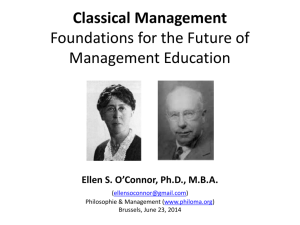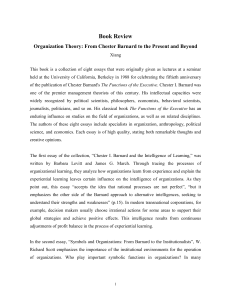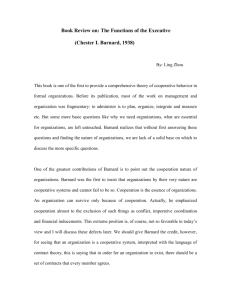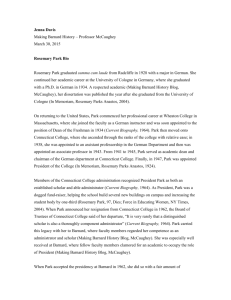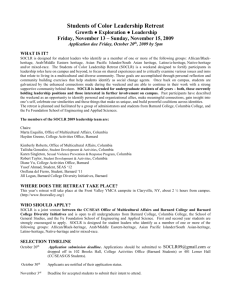Jacquelyn Mattfeld Biography – Amanda Breen
advertisement
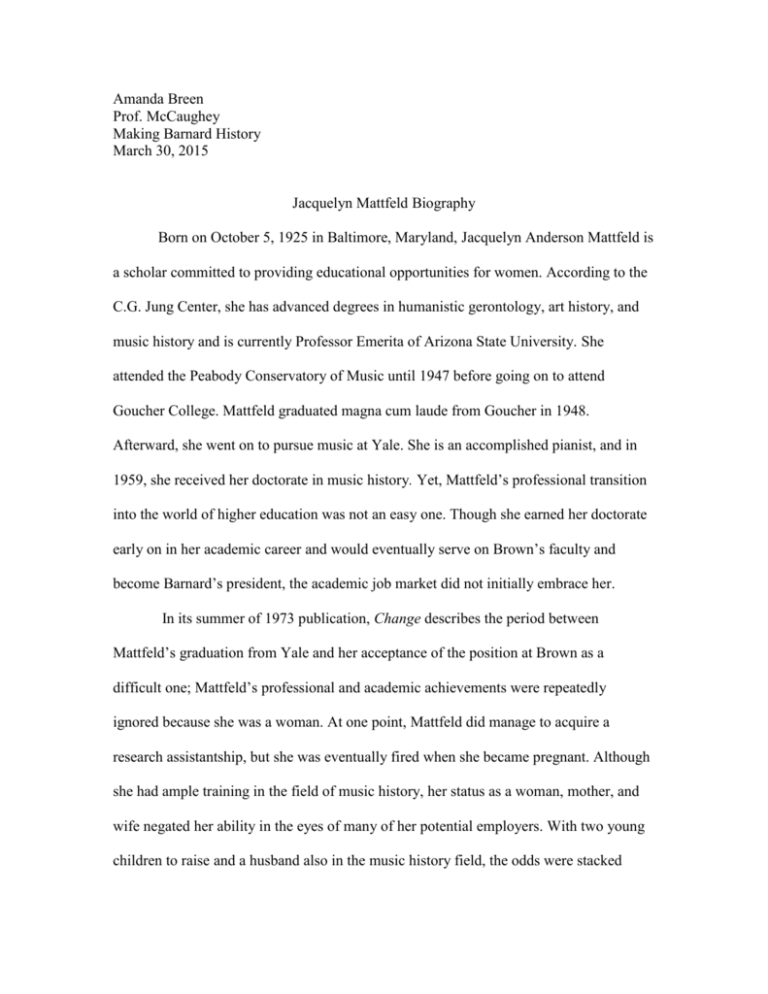
Amanda Breen Prof. McCaughey Making Barnard History March 30, 2015 Jacquelyn Mattfeld Biography Born on October 5, 1925 in Baltimore, Maryland, Jacquelyn Anderson Mattfeld is a scholar committed to providing educational opportunities for women. According to the C.G. Jung Center, she has advanced degrees in humanistic gerontology, art history, and music history and is currently Professor Emerita of Arizona State University. She attended the Peabody Conservatory of Music until 1947 before going on to attend Goucher College. Mattfeld graduated magna cum laude from Goucher in 1948. Afterward, she went on to pursue music at Yale. She is an accomplished pianist, and in 1959, she received her doctorate in music history. Yet, Mattfeld’s professional transition into the world of higher education was not an easy one. Though she earned her doctorate early on in her academic career and would eventually serve on Brown’s faculty and become Barnard’s president, the academic job market did not initially embrace her. In its summer of 1973 publication, Change describes the period between Mattfeld’s graduation from Yale and her acceptance of the position at Brown as a difficult one; Mattfeld’s professional and academic achievements were repeatedly ignored because she was a woman. At one point, Mattfeld did manage to acquire a research assistantship, but she was eventually fired when she became pregnant. Although she had ample training in the field of music history, her status as a woman, mother, and wife negated her ability in the eyes of many of her potential employers. With two young children to raise and a husband also in the music history field, the odds were stacked against her. As a result, in the decade following her time at Yale, Mattfeld was a private piano teacher. Her days as a music teacher were cut short when she received a call from Mary Bunting, then the president of Radcliffe. Bunting wanted Mattfeld to consider a career in administration, and Mattfeld decided to take her up on her offer. Mattfeld’s time spent at Radcliffe as director of financial aid, at MIT as associate dean of student affairs, and at Sarah Lawrence as provost and dean of the faculty laid the foundation for her future administrative endeavors in higher education. Finally, in July of 1971, Mattfeld was offered the appointment at Brown. She was named assistant provost and dean of academic affairs, the highest position held by a woman in the Ivy League at that time. Mattfeld realized that she had an important power, the ability to open the very doors that had been closed to her for so many years: “‘I want to be remembered not as the first lady of the Ivy League but as a reformer. I want to expand the university, to open it to all ages, races, sexes. I care passionately about that’” (McCain 20). She entered Brown at a unique time; the college had just overhauled its curriculum in 1969, scrapping its longimplemented freshman survey courses in favor of more independent, critical ones. Students could opt to receive a traditional letter grade or elect the pass/no pass option. In the midst of everything, the college was also experiencing significant financial strain. In her new position, Mattfeld oversaw the curriculum as well as the academic counseling of undergraduates (McCain 20). During her time at Brown, Mattfeld was offered numerous appointments that included college presidencies, vice-presidencies, and other executive positions in higher education, but she rejected them all before deciding to become Barnard’s next president. When asked why she turned down the Swarthmore presidency, Mattfeld replied: “‘[Swarthmore represents] a world I already know and love…I am afraid I would no longer grow and develop and stay a part of our times in a habitat so genial’” (McCain 21). On July 1, 1976, Mattfeld began her presidency at Barnard, but her new role was not without its challenges, and it certainly allowed her to continue to “grow and develop” as the climate was not always “genial.” “Mattfeld Presidency” highlights some of the difficult requests and negotiations that Mattfeld took on in her new position. In October of that year, the trustees called upon her to resolve six years of budget deficits. Yet, in 1977, Mattfeld set her sights on equal pay; she wanted Barnard’s faculty to receive salaries comparable to those of Columbia’s. Faced with mounting deficits and continual inflation, Mattfeld increased enrollments and the cost of student housing. Her efforts in those areas were not met without criticism, but one of the more successful actions of her presidency involved Columbia University’s William J. McGill and her fight to keep Barnard autonomous. Like her arrival at Brown, Mattfeld’s arrival at Barnard came at a tense moment in the institution’s history, a period outlined in “Jacquelyn Mattfeld.” While the administration at Brown had been determined to completely revise its curriculum, the administration at Columbia, led by President William J. McGill, was determined to do away with the distinction between Barnard and Columbia once and for all. Barnard was in dire need of someone to pacify McGill’s unflinching resolve, and Mattfeld was more than up to the task. McGill may have had strong convictions about the future of the College, but Mattfeld’s were just as strong, and they were eventually able to come to an agreement; while Barnard remained autonomous, a partnership between it and Columbia was finally established. When Mattfeld left Barnard in 1981, she was content; she felt that her presidency had been successful and productive. She was especially proud of the fact that the College continued to function as its own institution, separate from Columbia. After leaving Barnard, Mattfeld continued to pursue her career in academia. She co-founded the M.A. in Gerontology program at Northeastern Illinois University and developed the Program in Creative Aging at the C.G. Jung Institute of Chicago. She has spent almost the last 20 years teaching, researching, and writing on the theories and experiences of late life development. She also served as the Executive Director and Director of Public Programs of the C.G. Jung Center. There, she was also on the Board of Trustees until 2014, and is now a Board Member Emeritus (The C.G Jung Center). Works Cited Barnard College. “Jacquelyn Mattfeld.” N.p., n.d. Web. 27 Mar. 2015. The C.G. Jung Center. “Jacquelyn A. Mattfeld, Ph.D.” N.p., n.d. Web. 29 Mar. 2015. McCain, Nina. “Jacquelyn Mattfeld of Brown.” Change 5.6 (1973): 19–21. Print. McCaughey, Robert. “Mattfeld Presidency.” Making Barnard History. 14 May 2014. Web. 27 Mar. 2015.


